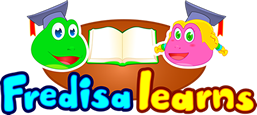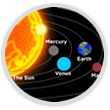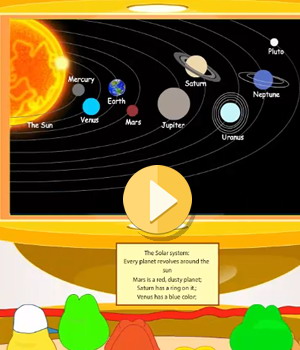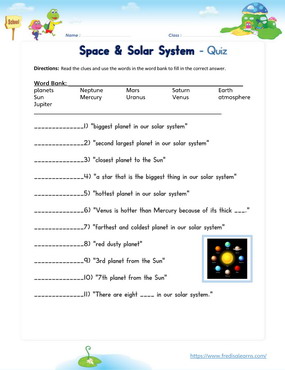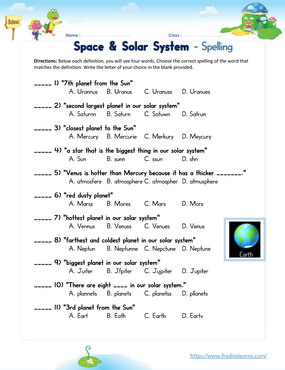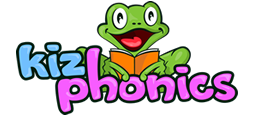Unit 1: Space Museum
Objectives:
- This English lesson teaches children vocabulary about our solar system and the eight planets.
- The lesson also teaches ESL kids how to compare and contrast the 8 planets using comparatives and superlatives – bigger/biggest/farther/farthest.
Main Lesson Materials & Study Steps
1st –This cartoon animated video features a short dialogue, followed by vocabulary and sentence breakdown. It is essential for introducing the words, phrases, grammar, spelling and sentences of the lesson in context. Watch repeatedly to master the content. The video plays on any device.
2nd – Then the student plays this fun game after watching the video, to practice the contents of the lesson. The game reviews key vocabulary, grammar and sentences from the lessons. This game can be played on any device.
3rd – Finally the learner takes this test of the unit. The score of this test is captured in the LMS and gives educators an idea of how well their learner is doing. The test opens on any device – mobile & PC.
Worksheets for the Unit
The worksheets below are useful for offline and classroom activities. These printable exercises directly correlate with the above lesson 'Space Museum'. Every worksheet comes with an answer sheet on the second page for educators.
Already a Member?
Not a member yet?
Lesson Story:
Ms. Ann has just brought her students to the space museum, where they get to learn a lot from each other about the eight planets and our solar system. Lisa, Freddie, Bob and Sally take turns asking and answering questions. Lisa gets to learn more about space than she knew before.
Vocabulary:
8 Planets:
| Mercury | Venus | Earth | Mars | Jupiter | Saturn | Uranus | Neptune |
Space words:
Sun, heat, planets, atmosphere, star, rings, solar system
Comparatives & Superlatives
| big | bigger | biggest |
| hot | hotter | hottest |
| thin | thinner | thinnest |
| cold | colder | coldest |
| near | nearer | nearest |
| far | farther | farthest |
First 4 Planet Facts
| Planet | Distance from the sun | Fact |
| Mercury | nearest to the Sun | but not the hottest |
| Venus | 2nd planet from the Sun | hottest planet |
| Earth | 3rd planet from the Sun | not too hot, not too cold |
| Mars | 4th planet from the Sun | red, dusty, not hot, not too cold |
Sentences: Comparatives & Superlatives
Superlatives: First 4 Planets
- Mercury is the nearest planet to the Sun.
- Venus is the second nearest planet to the Sun.
- Venus is the hottest of all eight planets.
- We live on Earth. It is one of the hottest planets in our solar system.
Venus Fact: Why is Venus the hottest planet, not Mercury?
- Venus is the hottest because it has a thick atmosphere that traps the heat from the Sun.
- Mercury is nearest to the Sun but not the hottest because its atmosphere is thinner than that of Venus.
- A thinner atmosphere allows some of the Sun’s heat to escape.
- A thicker atmosphere keeps much of the Sun’s heat.
Superlatives: Last 4 Planets
- Jupiter is the biggest planet in our solar system.
- Saturn is the second biggest planet in our solar system.
- Neptune is the coldest planet in our solar system.
- Neptune is also the farthest planet from the Sun.
Facts about the Sun
- The sun is a star, not a planet. It is the biggest thing in our solar system.
- Without the Sun, there will be no life on Earth.
- The sun is a dying star.
This lesson is part of the Level 7 English course.
Ready for an out-of-this-world adventure? Get ready to blast off into space with this exciting English lesson! In this unit, kids will learn all about the eight planets in our solar system and how to compare and contrast them using comparatives and superlatives.
But that's not all - this lesson also includes vocabulary about our solar system, including important terms like "orbit" and "asteroid belt." Children will feel like real astronauts as they explore the mysteries of the universe and learn about the unique features of each planet.
In addition to learning about the planets, kids will also practice their language skills by describing the planets using adjectives in the comparative and superlative form. They'll learn how to use words like "bigger" and "farthest" to compare and contrast the planets.
So, strap on your space suit and get ready for a cosmic adventure with this English lesson! By the end of it, your child will be a space expert and have a whole new set of language skills under their belt.
